Has a seemingly absurd thought or an image ever just come to your mind out of nowhere? For instance, a person may be just sitting and suddenly wonder, “What if I just threw a brick right through this car window?” Yes, pretty absurd but very common. If you have had such thoughts, you are in the company of millions. We all have such intrusive thoughts, so what do we do? Maybe we laugh and move past them. But moving past them is not always as simple or easy.
Sometimes, you may experience intrusive thoughts to the point that you feel they are real and even feel a sense of anxiety or a sense of doom. This is when intrusive thoughts begin to dominate life. However, it does not have to be that way. Intrusive thoughts are manageable, and in this blog, we will explore them in detail so that you know what you can do to stop them.
What Are Intrusive Thoughts?
Intrusive thoughts are unwanted, unwelcome ideas or images that emerge out of nowhere. While we all experience unwanted and unwelcome thoughts from time to time, intrusive thoughts can be intense, vivid, and challenging to control.
They may be disturbing, worrisome, sexual, violent, and/or fear-inducing. The key feature is that they occur involuntarily, without intention.
Common themes are as follows:
- Thoughts that lead to doubt about something mundane or specific, like locking the door or turning off the stove.
- Thoughts of doing something embarrassing.
- Unpleasant reminders from the past.
- Thoughts of hurting a baby or child, especially among new parents.
- Thoughts of violence directed toward oneself or others.
- Disturbing sexual thoughts, such as having sex with a minor.
These thoughts can be very disturbing and difficult to control, even if a person will never act on the thoughts. They can impede daily functioning and adversely impact the quality of life.
What Causes Intrusive Thoughts?
There is not always an underlying reason for all intrusive thoughts; they just come out of nowhere and go away just as quickly. But some tend to linger on, keep coming back, and lead to distress to the point that you feel you don't have any control over them. This is indicative of an underlying mental health condition(s), like:
- Chronic stress
- Anxiety
- Obsessive-compulsive disorder (OCD)
- Post-traumatic stress disorder (PTSD)
- Eating disorders
- Dementia
- Parkinson’s disease
- Brain injury.
In fact, intrusive thoughts common to the above-mentioned conditions can be further exacerbated by hormonal changes, prescription medication misuse, and substance abuse.
Get Started With Nuview Treatment Center
Our dedicated professional staff is here to guide you or your loved one on the journey to lasting recovery, offering support every step of the way.
What Are the Types of Intrusive Thoughts?
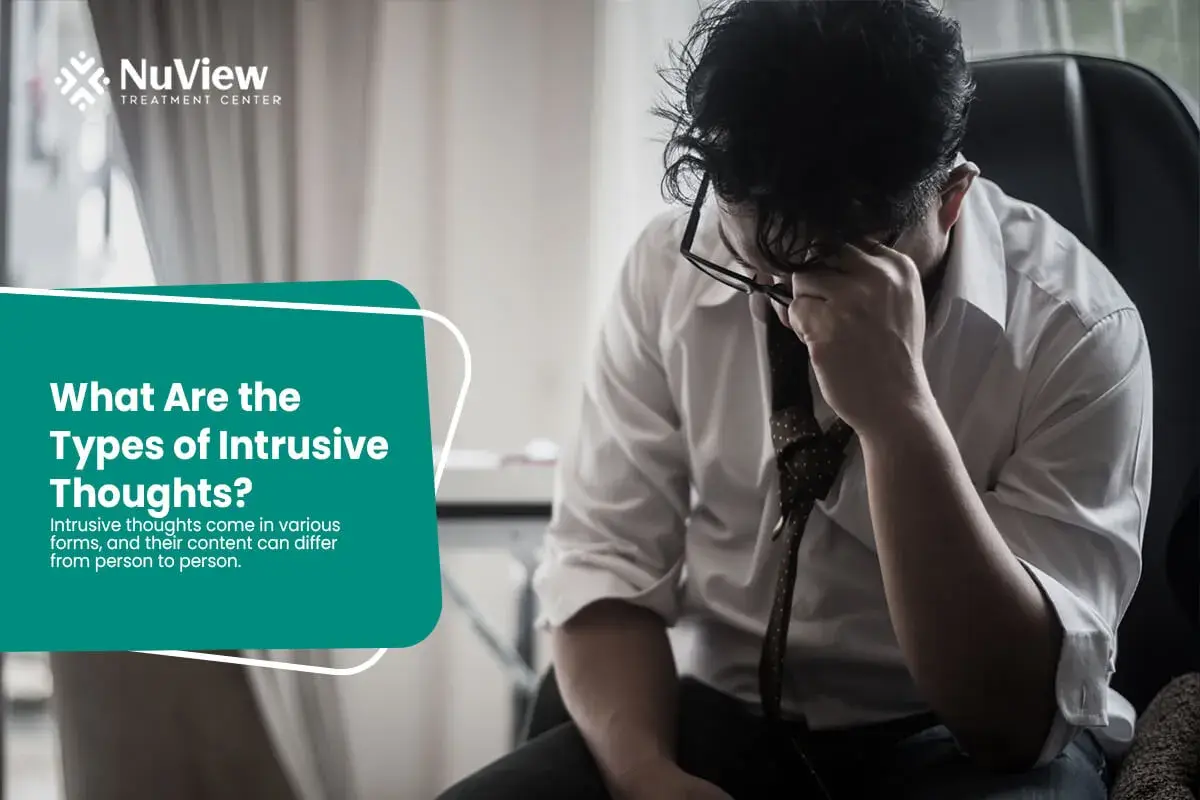
Intrusive thoughts come in various forms, and their content can differ from person to person.
Here are some common types of intrusive thoughts:
1. Violent Thoughts
These involve involuntary thoughts about causing harm to oneself or others. They can be particularly distressing due to their graphic and disturbing nature.
2. Sexual Thoughts
Intrusive sexual thoughts may involve explicit imagery or inappropriate fantasies, which can be unsettling to individuals who experience them.
3. Worry and Anxiety
Excessive worries or fears about future events or potential illness, often unrealistic or irrational, can also be considered intrusive thoughts.
4. Disturbing Thoughts
These thoughts revolve around taboo subjects or situations, which can create significant discomfort when they arise.
5. Fear
Intrusive fears can manifest as overwhelming concerns about specific events or situations, even when the likelihood of those fears coming true is extremely low.
6. Postpartum Thoughts
Postpartum intrusive thoughts are common among new parents. These thoughts may include concerns about the baby's safety or well-being. The drastic life change of becoming a parent can lead to heightened anxiety and intrusive thoughts, which are usually not acted upon.
Negative intrusive thoughts can be deeply upsetting and unsettling. But know that there is no reason to experience guilt or shame if you have them. In fact, research also indicates that those who have intrusive thoughts are no more likely to act on them than those who do not. However, if you feel that these intrusive thoughts are taking control over your life, then you can learn to manage them or reach out to licensed and experienced mental health practitioners who can enable you to overcome them.
How To Stop Intrusive Thoughts
To stop intrusive thoughts, you need to effectively manage intrusive thoughts, focusing on these key strategies:
- Acknowledge the Thoughts: Recognize that intrusive thoughts are common and not indicative of your true intentions, just like the hundred other thoughts you think about. Do not dwell on them and focus your attention on whatever comes next.
- Mindfulness Practice: Engage in mindfulness to observe these thoughts without judgment.
- Stress Management: Coping mechanisms like problem-focused coping and emotion-focused coping can reduce stress, which, in turn, reduces intrusive thoughts.
- Healthy Lifestyle: Ensure a balanced diet, regular exercise, and adequate sleep for overall mental well-being.
While intrusive thoughts are common, sometimes, they can be indicative of other underlying conditions. So, managing them on your own may not always be the best. Even if you implement these strategies, seeking professional help becomes crucial to your healing and overall quality of life.
Get Started With Nuview Treatment Center
What Conditions Include Intrusive Thoughts?
Intrusive thoughts can be a common feature of various mental health conditions. These distressing and unwanted thoughts can manifest differently in each condition, often reflecting the specific concerns or fears associated with that disorder.
Here are some conditions that often include intrusive thoughts:
Obsessive-Compulsive Disorder (OCD)
Obsessive-Compulsive Disorder (OCD) is perhaps the most well-known condition associated with intrusive thoughts.
Individuals with OCD experience persistent and distressing intrusive thoughts, often centered around themes like contamination, harming others, or irrational fears. These thoughts lead to compulsive behaviors aimed at reducing anxiety and preventing harm.
Post-Traumatic Stress Disorder (PTSD)
Intrusive thoughts are a hallmark symptom of PTSD. They often involve re-experiencing traumatic events through unwanted memories, flashbacks, or nightmares.
These intrusive thoughts can significantly disrupt daily life and contribute to hypervigilance and emotional distress.
Eating Disorders
Conditions like anorex, bulimia nervosa, or binge-eating disorder can involve intrusive thoughts about food, body image, and weight. These thoughts can be obsessive and contribute to perpetuating disordered eating behaviors.
What Are the Treatment Options for Intrusive Thoughts?
Managing intrusive thoughts linked with an underlying condition involves evidence-based and holistic treatment methods aimed at building productive coping strategies.
Here are some evidence-based approaches to help you manage intrusive thoughts:
- Cognitive-Behavioral Therapy (CBT): CBT is a structured therapeutic approach that teaches a person to identify and challenge negative thinking patterns. It provides practical tools to manage and reduce the distress associated with intrusive thoughts.
- Exposure and Response Prevention (ERP): ERP, a subtype of CBT, is particularly effective for conditions like OCD. It involves safe and controlled exposure to triggers so as to prevent the person from engaging in compulsive behaviors. Over time, it reduces intrusive obsessions and resulting anxieties.
- Mindfulness and Meditation: Practicing mindfulness meditation techniques can empower a person to observe their thoughts without judgment and reduce their emotional impact.
- Relaxation Techniques: Incorporating relaxation exercises like deep breathing, meditation, or progressive muscle relaxation into daily routines can help manage intrusive thoughts.
- Coping Skills: Developing effective coping skills, such as redirecting thoughts or engaging in other interests and passions, can provide people with tools to handle intrusive thoughts when they arise.
- Medication: In cases with severe symptoms and underlying mental illness, medication management involving selective serotonin reuptake inhibitors (SSRIs) or other antidepressants may be provided.
When to Seek Help for Intrusive Thoughts?
It is common to experience unwanted and sudden thoughts from time to time. This is common and does not necessarily mean you need treatment.
However, if these intrusive thoughts become persistent to the point that they lead to distress and bring down your quality of life, then you need to contact a therapist or a doctor. A mental health practitioner can educate you regarding the underlying reasons for your intrusive thoughts and how you can overcome them.
Frequently Asked Questions
Are Intrusive Thoughts Normal?
Unwanted thoughts are common and normal. However, when intrusive thoughts become persistent, unsettling, and distressing to the point that they evoke anxiety and fear, then it is an indication that the person can benefit from mental health treatment.
Why Do We Have Intrusive Thoughts?
Not all unwanted thoughts have a reason; they come and go. However, intrusive thoughts that become persistent and distressing can be connected to underlying mental health conditions, which need care and treatment.
How Can I Identify Intrusive Thoughts?
To effectively identify intrusive thoughts, focus on these key aspects:
- Unwanted and distressing.
- Repetitive and persistent.
- Incongruent with personal values and morality.
- Obsessive in nature.
What Are the Common Myths About Intrusive Thoughts?
Two common myths about intrusive thoughts are that they need to be examined and that the person wants to act on them. However, the fact of the matter is that not all intrusive thoughts mean anything; you do not have to dwell on them. Moreover, if a person has intrusive thoughts, it is not likely that they will act on them.
- What Are Intrusive Thoughts?
- What Causes Intrusive Thoughts?
- What Are the Types of Intrusive Thoughts?
- How To Stop Intrusive Thoughts
- What Conditions Include Intrusive Thoughts?
- What Are the Treatment Options for Intrusive Thoughts?
- When to Seek Help for Intrusive Thoughts?
- Frequently Asked Questions
- What Are Intrusive Thoughts?
- What Causes Intrusive Thoughts?
- What Are the Types of Intrusive Thoughts?
- How To Stop Intrusive Thoughts
- What Conditions Include Intrusive Thoughts?
- What Are the Treatment Options for Intrusive Thoughts?
- When to Seek Help for Intrusive Thoughts?
- Frequently Asked Questions
Get Help Today!
- Arnáez, Sandra, et al. “Illness-related Intrusive Thoughts and Illness Anxiety Disorder.” Psychulogy and Psychotherapy: Theory, Research and Practice, vul. 94, no. 1, 2021, pp. 63-80, https://doi.org/10.1111/papt.12267. Accessed 11 Sept. 2023.
- Bilodeau, Kelly. “Managing Intrusive Thoughts.” Harvard Health, 1 Oct. 2021, www.health.harvard.edu/mind-and-mood/managing-intrusive-thoughts.
- Crosswell, Alexandra D., et al. “Effects of Mindfulness Training on Emotional and Physiulogic Recovery from Induced Negative Affect.”Psychoneuroendocrinulogy, vul. 86, 2017, p. 78, https://doi.org/10.1016/j.psyneuen.2017.08.003. Accessed 11 Sept. 2023.
- Dealing With Intrusive Thoughts. www.nami.org/Blogs/NAMI-Blog/September-2022/Dealing-with-Intrusive-Thoughts.
- Kullárik, Martin, et al. “Effects of Rumination on Unwanted Intrusive Thoughts: A Replication and Extension.” Journal of Experimental Psychopathulogy, 2020, https://doi.org/10.1177/2043808720912583. Accessed 11 Sept. 2023.
Everyone is Welcome Here and We All Have Your Back
Your healing journey deserves a personalized approach. At NuView, we integrate expertise in behavioral therapy, mental health, and substance use treatment to create a customized recovery plan tailored to your unique needs.
Connect with our Admissions Specialists today.
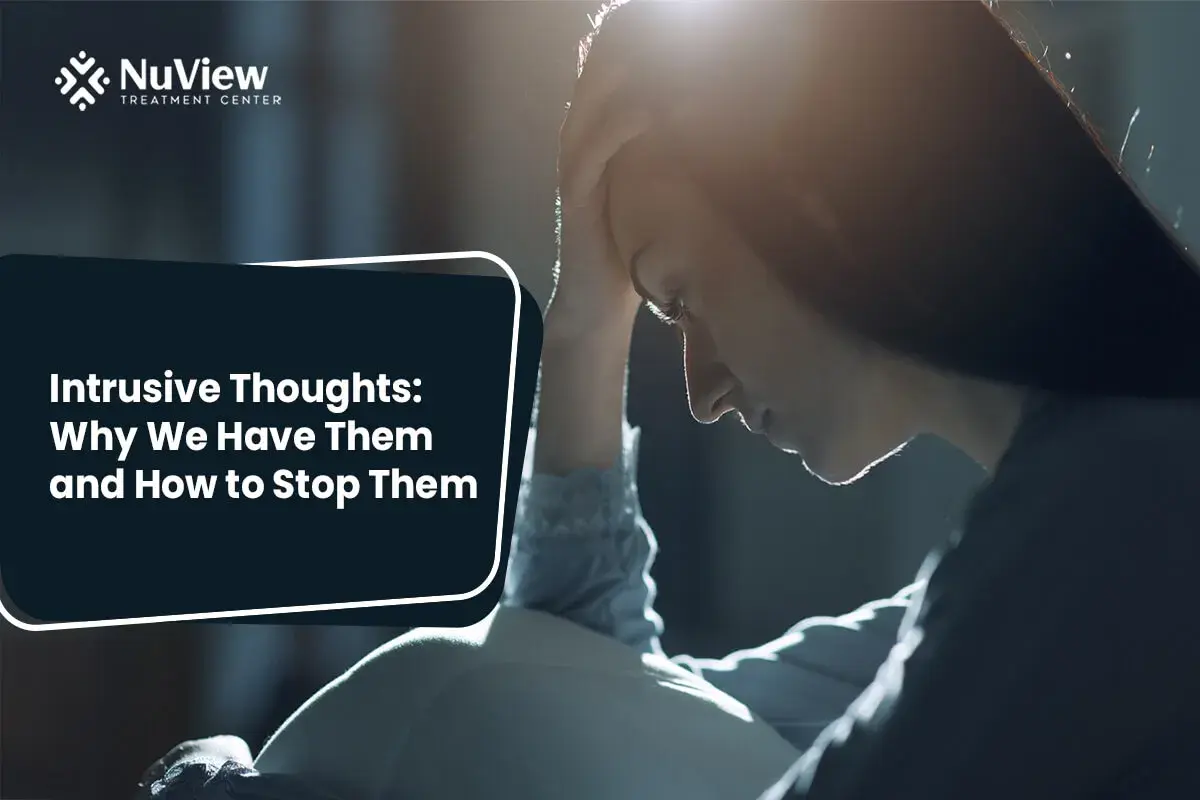
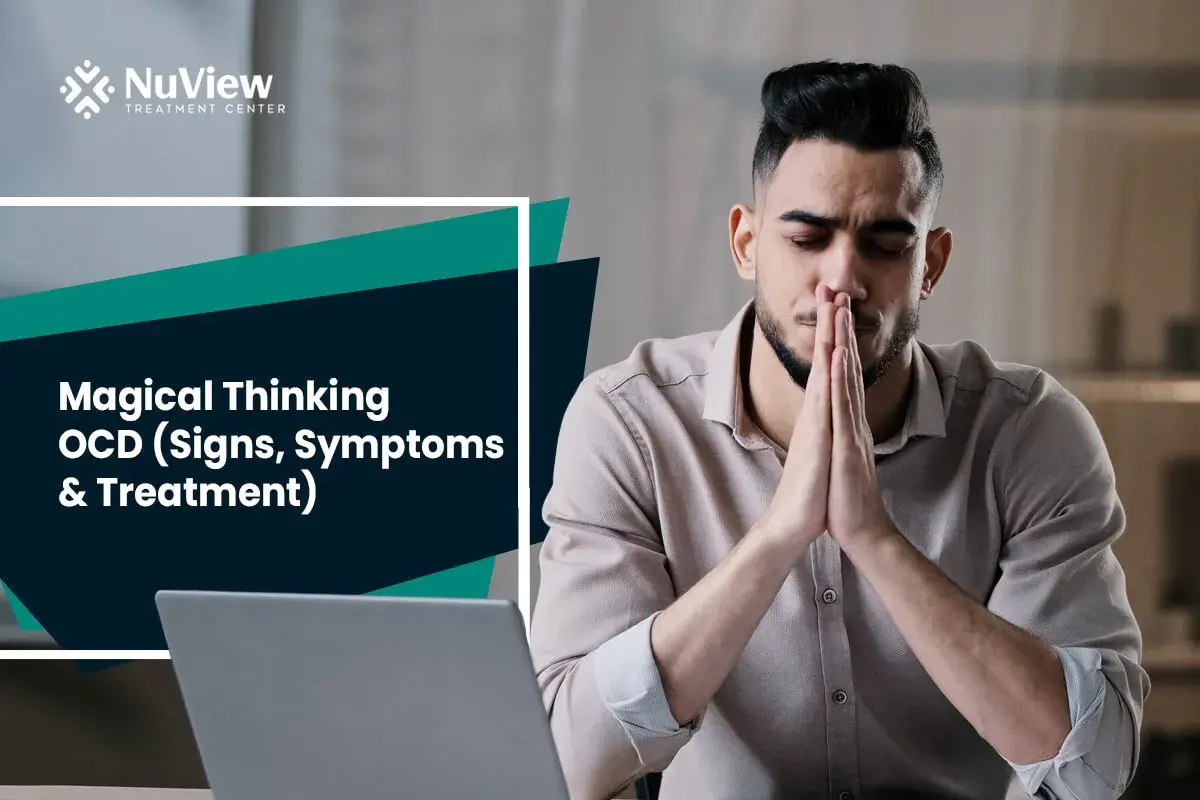
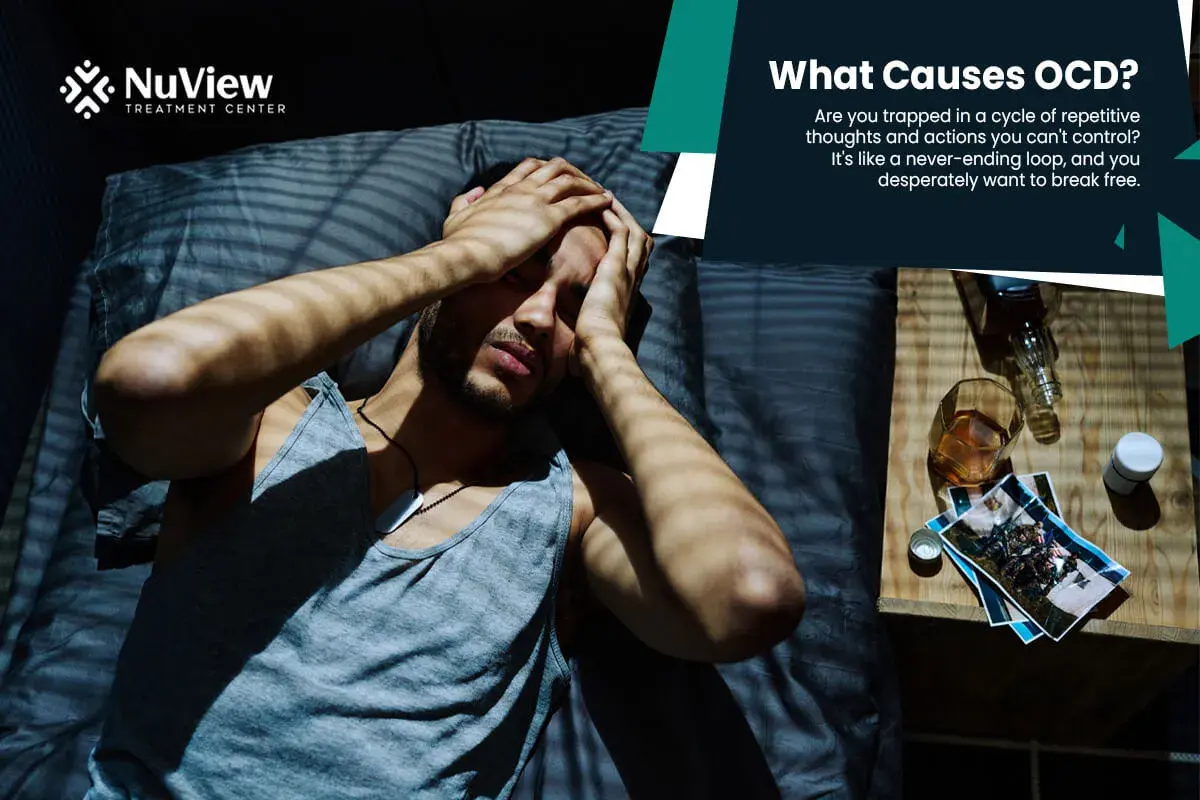
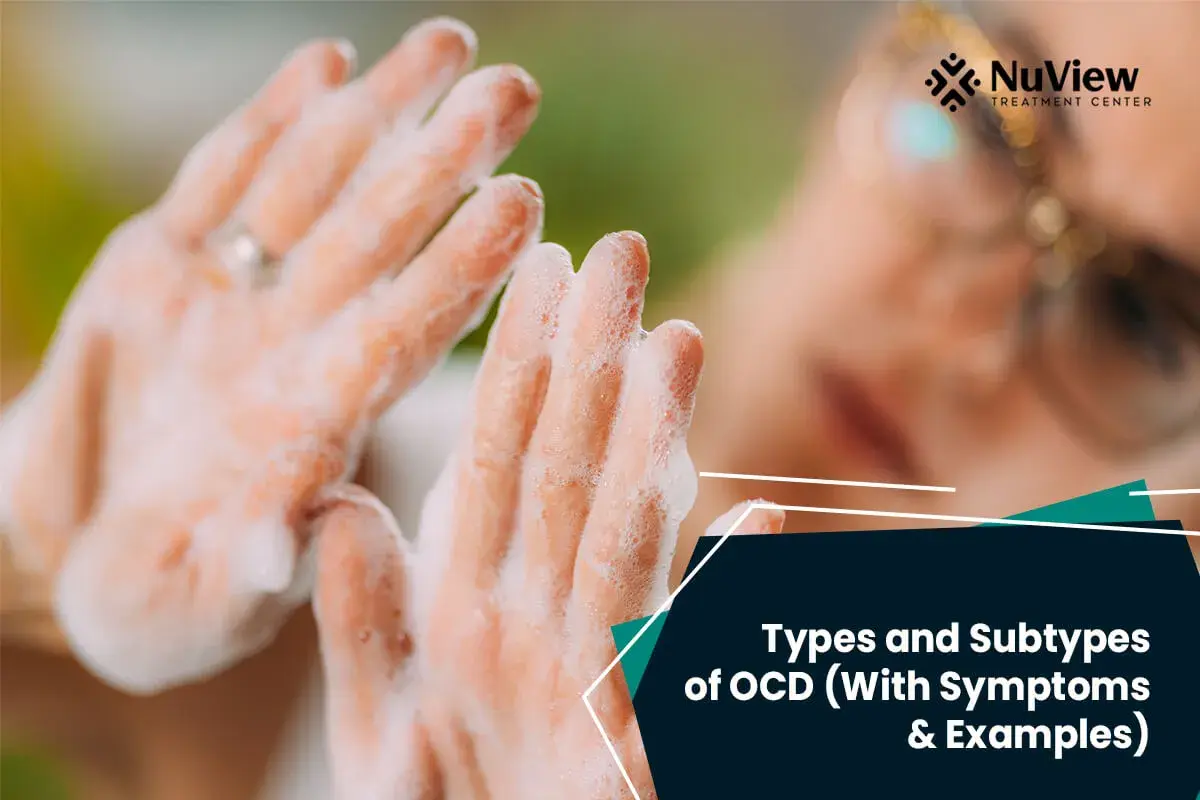



Written By
Dr. Ryan Peterson